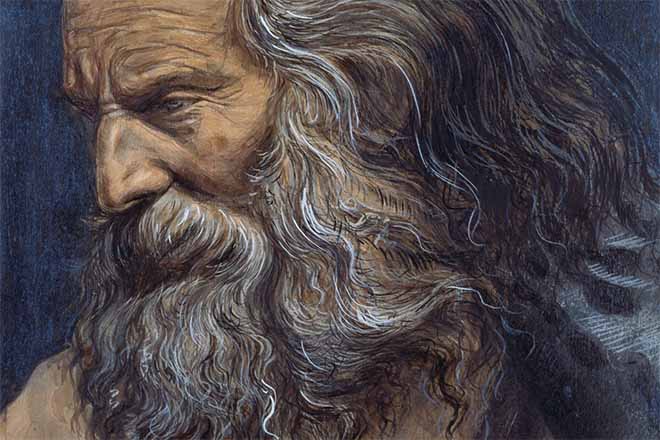As Old As 969 Years Methuselah : The Oldest Man in the Bible

Death is arguably the most terrible barrier facing man. Also, one of its oldest fights is trying to delay the fateful moment.
As old as Methuselah
According to the times, he turned to practices related to magic and then occultism. Nowadays, science has taken over. But the human imagination also fed on stories where characters lived indefinitely. The longevity attributed to Methuselah, one of the antediluvian patriarchs of Genesis, is proverbial. The 969 years given to him by the scribes in Scripture constitute almost the only information we have on this character. They give him a kind of record since his great-grandfather, Adam, would have lived 930 years, his grandfather, Seth, 912 years, and his father Enoch, 365 years - it is true that the latter did not die but was "taken" by God after a perfect life. Lamech, the son of Methuselah, is only credited with 177 years, but the line regains its strength with Noah, the hero of the Flood, who died at the age of 950 years.
One year per month of life?
The interpretation of these fabulous longevities is based on two hypotheses which are not contradictory. The first is that the years granted to the patriarchs are in fact the number of months of their life: we would thus obtain approximately 77 years for Adam, 76 for Seth, roughly 81 years for Methuselah, the oldest man in the bible, 30 years of terrestrial existence for Enoch and 79 years for Noah. On the other hand, according to this calculation, Lamech would have lived barely fifteen years. The scribes would have operated these conversions in order to exalt men considered to be admirable. According to another theory put forward by Bible scholars, these supernatural lives were invented to establish flawless genealogies based on a very small number of names, for immense prehistoric periods.
We find this way of proceeding in Berossus, for example, who in his History of Babylonia dating from around 280 BC affirms that the reigns of ten kings of the fabulous times cover not less than ... 432 000 years.
The “biological barrier”
More certainly, through the centuries, history teaches us sporadically the existence of people who have greatly exceeded the life expectancy of their time. It has lengthened in extraordinary proportions since prehistoric times, but the essential “take-off” only dates from the 19th century. In fact, a man of today lives on average three times longer than a man of Cro-Magnon. On the other hand, recent research places the biological barrier of the human species around 110 years old. A Colombian in 1958 would have reached the respectable age of 160 years. Record commemorated by the Colombian Post Office with a stamp with the caption: “The oldest man in the world”! The most famous “dean of humanity”, the Frenchwoman Jeanne Calment, died at the age of 122. This notion of biological barrier was brought to light in 1965 by an American, Professor Leonard Hayflick: his in vitro experiments seem to prove that cells behave as if they have a kind of internal clock which determines in advance how long they will live and continue to divide. So everything happens, to quote humorist Pierre Dac, as if death were, literally, "a lack of good manners".
Stories of immortals
Already, Assyro-Babylonian mythology, in the Epic of Gilgamesh, in the third millennium BC, evokes the possibility of immortality. This theme discreetly crosses the history of literature until the 19th century, then flourishes within a fantastic current which generally treats it as a curse. Important works, such as The Wandering Jew by Eugène Sue (1844), She: A History of Adventure by Sir Henry Rider Haggard (1887-1923), Dracula by Bram Stoker (1897) or very popular series in their time, such as the one devoted to the enigmatic Dr Nikola by Guy Boothby (1895-1901), illustrate the pursuit of a dream which turns out to be, ultimately, a physical and mental nightmare.
In the twentieth century, the evolution of science offers new resources. But the stories remain dominated by the idea that extreme longevity only provides boredom and that it can only be acquired at the cost of morally unacceptable compromises: thus the scientist Faust does not hesitate to make a pact with the devil in exchange for a new youth.









































































































































































































































































































































